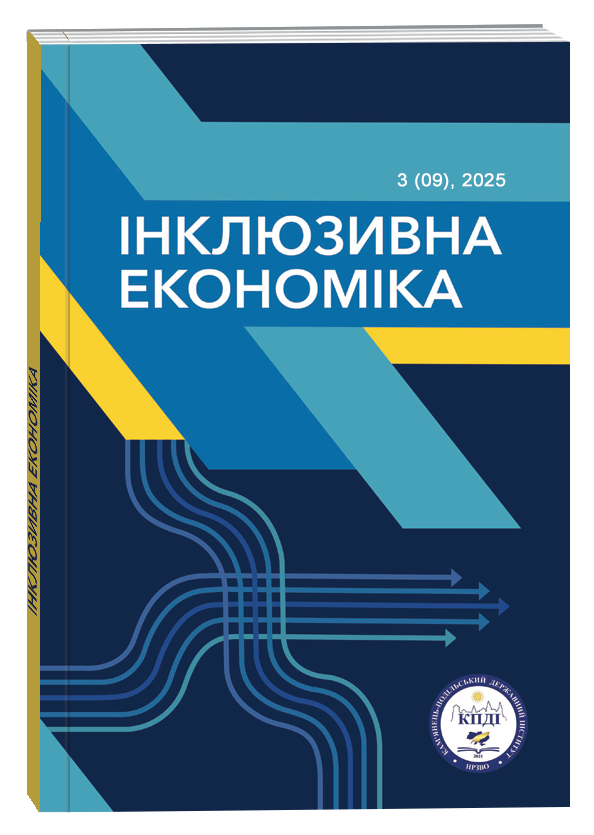THE ESTIMANTION OF ENVIRONMENTAL TAX EFFECTS ON THE EFFECTIVE WASTE MANAGEMENT SYSTEM BUILDING AS THE PREMISE OF STATE ECONOMIC SECURITY ENSURING
DOI:
https://doi.org/10.32782/inclusive_economics.9-2Keywords:
economic security, economics, environmental tax, tax management, regulating function, enterprise, industrial waste, waste management system, recycling, landfill, incineration, correlation analysis, regression analysis, circular economy, managementAbstract
Introduction. To overcome threats to state economic security caused by full-scale war, the development of efficient tools for balancing economic, ecological, and energy aspects of economic activity acquires special importance. Purpose. Measuring of the strength and direction of the linear relationship between environmental tax revenue and industrial waste generation rates using correlation and regression analysis. Methods. Analysis of literary sources and conducting research on the problems of effective environmental tax system building for ensuring of state economic security. The correlation and regression analysis between amount of pollution tax revenue and the key parameters of national waste management system. The methods of statistical analysis of data on industrial waste generation rates as well as amount of recovered, incinerated and disposed waste by regions of Ukraine for the period from 2017 till 2023. Results. The dynamics of indicators of the pollution taxes revenue to the Consolidated budget by regions from 2017 till 2021 were analyzed. Based on data on the volume of waste generated by commercial activities, amount of recovered, disposed and incinerated waste, the relationship between environmental tax revenue and waste management system efficiency in Ukraine was analyzed. It was determined that there is a certain relationship between the environmental tax revenue and the amount of industrial waste generated. Conclusion. Correlation analysis has been carried out. In the first case it has been applied between amount of pollution tax revenue and volume of waste generated by commercial activities. The gained correlation coefficient is quite high and equals to 0,87, which implies that pollution tax has big impact on industrial waste generation rates. In the second case it has been calculated the impact of volume of pollution tax revenue on amount of recovered, disposed and incinerated waste by regions of Ukraine. The obtained correlation coefficients are 0,48, 0,98, and - 0,73 respectively. So, it is possible to state that pollution tax has the biggest effect on waste disposing. The following empiric equation of simple linear regression was obtained, where dependent variable is amount of disposed waste, independent factor is volume of pollution tax revenue. The generated model has the following equation: Disposed waste amount = 0,0001* volume of pollution tax revenue – 387,792. Thus, the amount of disposed waste will decrease, if pollution tax rate grows. The main problems of environmental taxation in Ukraine were identified and a list of priority tasks, the consistent implementation of which contributes to the favorable conditions for Ukrainian waste recovery industry building and state economic security ensuring, was proposed.
References
Веклич О.О. (2001). Екологічне оподаткування в Україні: Реалії та напрями вдосконалення з урахуванням світового досвіду. (Монографія). Київ: Либідь.
Синякевич І.М. Інструменти екополітики: теорія і практика: монографія. Львів: Вид-во ЗУКЦ, 2003. 88 с
Мішенін Є.В., Ярова І.Є. Системна оцінка результативності екологічного оподаткування у контексті соціо-еколого-економічної безпеки просторового розвитку. Збалансоване природокористування. 2019. № 1. С. 38–47.
Поліщук Л. М. (2019). Екологічне оподаткування в умовах децентралізації: пріоритети та інституціональне забезпечення. Агросвіт, 23, 73-78
Домбровська Т. М. (2014). Проблеми та перспективи екологічного оподаткування в Україні та світі. Науковий огляд, 4. URL: https://naukajournal.org/index.php/naukajournal/article/view/213
Податковий кодекс України: Закон України від 06.10.2022 р. № 2654-IХ. Відомості Верховної Ради України. 2011. № 13-17. Ст. 112.
Бухаріна Л. М., Бірюков Т. Функціональне та цільове призначення екологічного податку в системі менеджменту відходів. Management and entrepreneurship: trends of development issue, 2023, 4 (26), 4, 8-26. DOI: https://doi.org/10.26661/2522-1566/2023-4/26-01.
Екологічні податки України. Екоподатки за місцем реєстрації. SaveEcoBot: веб-сайт. URL: https://www.saveecobot.com/analytics/ecotaxes (дата звернення: 01.07.2025).
Утворення відходів по регіонах: статистичний збірник / Державний комітет статистики України. Київ, 2024. URL: https://www.ukrstat.gov.ua/operativ/operativ2018/ns/uv/arch_uv_u.htm (дата звернення: 01.07.2025).
Про управління відходами: Закон України від 20.06.2022 р. № 2320-IX. Голос України. 2022. № 141.
Veklych O.O. (2001). Ekolohichne opodatkuvannya v Ukrayini: Realiyi ta napryamy vdoskonalennya z urakhuvannyam svitovoho dosvidu: monohrafiya [Environmental taxation in Ukraine: Realities and directions of improvement taking into account world experience]. Kyyiv: Lybidʹ. (in Ukrainian)
Synyakevych I.M. (2003). Instrumenty ekopolityky: teoriya i praktyka: monohrafiya [Instruments of environmental policy: theory and practice]. Lʹviv: Vyd-vo ZUKTS, 188 p. (in Ukrainian)
Mishenin YE.V., Yarova I.YE. (2019) Systemna otsinka rezulʹtatyvnosti ekolohichnoho opodatkuvannya u konteksti sotsio-ekoloho-ekonomichnoyi bezpeky prostorovoho rozvytku. [Systematic assessment of the effectiveness of environmental taxation in the context of socio-ecological and economic security of spatial development]. Zbalansovane pryrodokorystuvannya № 1. S. 38–47. (in Ukrainian)
Polishchuk L. M. (2019). Ekolohichne opodatkuvannya v umovakh detsentralizatsiyi: priorytety ta instytutsionalʹne zabezpechennya [Environmental taxation in the context of decentralization: priorities and institutional support]. Ahrosvit, vol. 23, pp. 73-78 (in Ukrainian)
Dombrovsʹka T. M. (2014). Problemy ta perspektyvy ekolohichnoho opodatkuvannya v Ukrayini ta sviti [Problems and prospects of environmental taxation in Ukraine and the world]. Naukovyy ohlyad, vol. 4. Available at: https://naukajournal.org/index.php/naukajournal/article/view/213
Podatkovyy kodeks Ukrayiny: Zakon Ukrayiny vid 06.10.2022 r. № 2654-IKH. Vidomosti Verkhovnoyi Rady Ukrayiny [Tax Code of Ukraine: Law of Ukraine dated 06.10.2022 No. 2654-IX. Bulletin of the Verkhovna Rada of Ukraine]. Kyiv: Parlam. vyd-vo.
Biriukov, T. and Bukharina, L. (2023). Functional and targeted purpose of the environmental tax in the waste management system [Functional and intended purpose of the environmental tax in the waste management system]. Management and Entrepreneurship: Trends of Development, 4(26), pp. 8-26. DOI: https://doi.org/10.26661/2522-1566/2023-4/26-01
Ekolohichni podatky Ukrayiny. Ekopodatky za mistsem reyestratsiyi [Environmental taxes of Ukraine. History of ecotax payments 2017 – 2021]. Available at: https://www.saveecobot.com/analytics/ecotaxes (Accessed 1 July 2025). (in Ukrainian)
State Statistics Committee of Ukraine. Waste generation and management for 1995-2020: statistical collection. Available at: https://www.ukrstat.gov.ua/operativ/operativ2018/ns/uv/arch_uv_u.htm (Accessed 1 July 2025). (in Ukrainian)
Pro upravlinnya vidkhodamy: Zakon Ukrayiny vid 20.06.2022 r. № 2320-IX [Law of Ukraine on waste management № 2320-IX]. Holos Ukrayiny, 141. (in Ukrainian)



